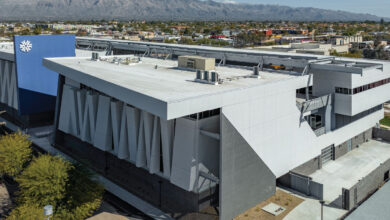
UArizona Reports Strong Year for Innovation, Commercialization
Despite slowdowns in research suffered by universities around the world due to the pandemic, the University of Arizona has experienced solid growth in the commercialization of university inventions. Between July 1, 2020, and June 30, 2021, Tech Launch Arizona, the commercialization arm of UArizona, received 274 invention disclosures – 11 more than the previous year.
TLA also executed 124 licenses and options for university inventions (29 more than the previous fiscal year), filed 391 patents (44 more than the previous year) and saw 100 patents issued (13 more than the previous year). In addition, the university launched 17 startups, which not only bring UArizona inventions to the world for the public good, but also create jobs and economic impact.
“We’re proud to have generated this level of activity, especially in the face of the year’s challenges,” said Doug Hockstad, assistant vice president of Tech Launch Arizona. “While growth all around is wonderful, we’re particularly happy to see the increase in invention disclosures, a clear indicator that our work to increase engagement among faculty, researchers and staff is bearing results.”
Hockstad said he is proud of the efforts of the entire TLA team during the pandemic.
“We often say that commercialization is a full-contact sport, requiring a lot of face-to-face interaction,” he said, “but everyone in the office made adjustments and extra effort to reach the level of activity and results we’ve seen this fiscal year. While I am excited to see everyone back in the fall, I’m impressed by their work and dedication over the last year.”
The university’s continuing efforts in commercialization are an important part of its land-grant mission, University of Arizona President Robert C. Robbins said.
“As a land-grant institution, we are tasked with bringing university expertise and discoveries to the public in ways that benefit people’s lives,” Robbins said. “The past year has again demonstrated the critical importance of this part of our mission, and engaging our faculty and researchers in these efforts is the starting point for our success.”
“Bringing innovative technology to the marketplace is one of the most powerful ways the University of Arizona translates research into impact for real people,” said Elizabeth “Betsy” Cantwell, University of Arizona senior vice president for research and innovation. “Our researchers continue to bring inventiveness and an entrepreneurial spirit to their work to address complex challenges and create new opportunities.”
In fiscal year 2021, UArizona launched the following startup companies to commercialize university inventions.
- AlgaeCell LLC is commercializing photobioreactors used for low-cost and high-volume microorganism growth. They were invented by professor Joel Cuello, postdoctoral scientist Chen-Han Shih, staff technician Yaser Mehdipour, visiting research specialist Andres Mayol and graduate assistant Shiwei He of the College of Agriculture and Life Sciences and the BIO5 Institute.
- BacVax Inc. is designing and developing vaccines against bacterial infections using a bioinformatics approach. The startup is based on the work of professor Terrence Stull and research associate professor Paul Whitby of the College of Medicine – Phoenix and Daniel Morton, research associate professor at Phoenix Children’s Hospital.
- Lean Life Sciences Inc. is developing effective, lower-risk anti-obesity supplements invented by assistant professor Young-wook Won, professor David Bull, and research specialists Minjin Jung and Angela Kim of the College of Medicine – Tucson, the BIO5 Institute and the UArizona Cancer Center.
- LivEndocrine LLC is developing new pharmaceutical treatments for Type II diabetes invented by associate professor Benjamin Renquist and former postdoctoral researcher Caroline Geisler of the College of Agriculture and Life Sciences.
- Luxxon Therapeutics LLC is developing light-based therapies for chronic pain invented by associate professor Mohab Ibrahim and professor Rajesh Khanna of the College of Medicine – Tucson and the BIO5 Institute.
- MeCo Diagnostics LLC is developing a mechanical conditioning multi-gene score for predicting and intervening in breast cancer bone metastasis. The score was developed by former postdoctoral research associate Adam Watson-Hurthig, associate professor Ghassan Mouneimne and assistant professor Casey Romanoski of the College of Medicine – Tucson and the BIO5 Institute.
- Module Therapeutics Inc. is commercializing cell therapies that use novel engineered receptors known as 5MCARs to precisely target and eliminate disease-causing T cells. The startup is based on the work of associate professors Michael Kuhns and Deepta Bhattacharya, and former doctoral student Heather Bronnimann of the College of Medicine – Tucson, the BIO5 Institute and the UArizona Cancer Center.
- NEUTherapeutics LLC is developing regenerative treatments and precision therapies to prevent, halt and cure neurodegenerative diseases. The startup is based on the work of professor Roberta Diaz Brinton, professor Kathleen Rodgers, assistant scientific investigator Yu Jin Kim and associate professor Heidi Mansour of the College of Medicine – Tucson, the College of Pharmacy, the UArizona Center for Innovation in Brain Science and the BIO5 Institute.
- NightRighter Inc. is commercializing a provider-focused, web-based learning course in cognitive behavioral therapy for insomnia, which was developed by professor Daniel Taylor of the College of Science.
- Paramium Technologies LLC is commercializing novel methods to produce low-cost, high-precision curved metal panels for use in communications, astronomy and architectural applications. The methods were invented by senior research associate Justin Hyatt, Regents Professor Roger Angel, and graduate student Christian Davila-Peralta of the James C. Wyant College of Optical Sciences and the College of Engineering, with former optical systems engineer Thomas Stalcup and former research assistant Eric Patterson.
- PARMedics Inc. is developing protease-activated receptor inhibitors, as a therapeutic for pain and asthma, invented by professor Scott Boitano of the College of Medicine – Tucson and the BIO5 Institute, with professor Theodore Price of the University of Texas, Dallas.
- Patmos Therapeutics Inc. is commercializing innovative methods and formulations using sirolimus for the treatment of pulmonary conditions and diseases. The startup is based on the work of associate professor Heidi Mansour and postdoctoral research associate David Encinas of the College of Pharmacy.
- PhytoCentric Solutions LLC is providing testing services to the food industry, as well as proprietary natural antimicrobial products for consumer applications, which were invented by associate professor Sadhana Ravishankar, research specialist Libin Zhu, former postdoctoral researcher Govindaraj Dev Kumar and assistant research scientist Bibiana Law of the College of Agriculture and Life Sciences and the BIO5 Institute.
- RaeSedo LLC is developing novel analogues of naturally occurring lung proteins for treatment of patients with asthma and other respiratory diseases. The startup is based on the work of associate professor Julie Ledford, professor Monica Kraft and research professor Josef Vagner of the College of Medicine – Tucson and the BIO5 Institute.
- Revolute Robotics LLC is developing a new generation of robots that can operate in any domain for extended periods of time, based on the invention of Ph.D. candidate Sahand Sabet and professor Parviz Nikravesh of the College of Engineering.
- Sunrise Human Technology LLC is commercializing a proprietary system to digitally record a person’s life events, personal thoughts and documents, and then allow users to pose questions to and receive answers from a virtual reality image of the person based on their recorded history. It was invented by Changxu Wu, a former professor in the College of Engineering.
- uPetsia LLC is developing engineered bacteria for dog and cat oral microbiota to improve health and breath. It was invented by associate professors Eric Lyons and David Baltrus of the College of Agriculture and Life Sciences and the BIO5 Institute.
Tech Launch Arizona will release its complete fiscal year 2021 annual report in September.





